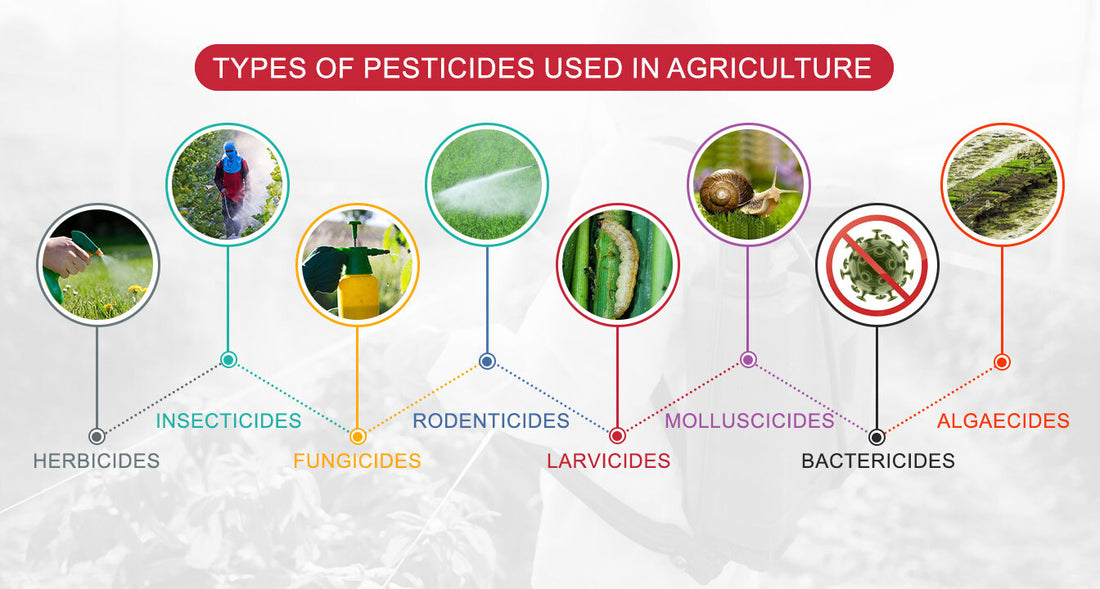Pests, weeds, and illnesses caused by them damage 40% of crops, and there are 30,000 species of weeds that can negatively impact crop growth. A crop can be destroyed by the 10,000 different varieties of insects that consume plants. If we don't take fast action to address the crops, these numbers could rise. Fortunately, a variety of insecticides are now readily available that kill pests, prevent their reproduction, and shield crops from harm.
Since not using them might result in farmers wasting resources like money, time, and effort, utilizing pesticides is not a choice but rather a necessity. Moreover, increased crop loss would result in reduced food sufficiency, since 795 million people worldwide lack sufficient access to food to survive. Using a pesticide is therefore not at all an option.
Furthermore, if you are sold on the notion of using pesticides, read on to learn what pesticides, their advantages, and the many kinds you need to buy. We will also assist you in deciding which organic pesticides to switch to.
Pesticides: What Are They?
A chemical-based product known as a pesticide is used to ward off, manage, and kill pests—animals or plants. They utilize a variety of biological agents, including disinfectants, antimicrobials, bacteria, and viruses, to manage agricultural pests that might harm animals and crops. In contrast, pests can include fungi, rodents, slugs, insects, weeds, snails, bird mites, etc.
Various Types Pesticides Used in Agricultural -
Based on their use or the sort of pests they are intended to control, pesticides can be divided into several categories. Let's discuss the kind and brand of pesticides:
- Herbicides: Herbicides stop the weeds from developing so that the crops won't lose the nutrients they need to grow. In addition, a number of pesticides that are used as herbicides in agriculture include 2,4-D, Clethodim, Glyphosate, Bentazon, and Clethodim.
- Insecticides: Insecticides target insects' neurological systems, as their name implies, in an effort to prevent them from inhibiting one another or reproducing. Some of the pesticides that are employed as insecticides include organophosphate, carbamates, nicotinoids, fumigants, and biological.
- Fungicides: Fungicides support the full eradication of fungi by inhibiting their growth. In the presence of air, they can also decompose quickly in the soil. Several pesticides are employed as fungicides, including maneb, nabam, and cycloheximide.
- Rodenticides: These are chemicals that are used to keep rodents, including fish, birds, and mammals that can ruin crops, out of homes, including rats, mice, gophers, and even. Also included in the list of rodenticides are chlorophacinone, diphacinone, brodifacoum, and bromadiolone.
- Larvicides: In order to stop vector-borne diseases like malaria, larvicides are pesticides that restrict or reduce mosquito larvae growth or their ability to reproduce.
- Molluscicides: Pesticides that typically prevent mollusks like snails, slugs, and others from living in or spreading in a certain area.
- Bactericides: Pesticides eliminate unwanted microorganisms from crops and livestock or stop them from spreading.
- Algaecides: For higher agricultural yields, these herbicides either eradicate algae or prevent their growth.
To protect crops and harvests from harmful chemicals, many farmers and people favor using organic pesticides.
1. Organic pesticides: Chemicals known as organic insecticides are derived from natural resources like minerals and plants. They are less dangerous than pesticides with only chemical ingredients, despite the fact that they are not entirely chemical-free.
2. Microbial Pesticides: Microbial pesticides are substances made from bacteria, algae, fungi, natural protozoans, or viruses. Moreover, these pesticides reduce the amount of insects produced by infecting the insect population and releasing a toxin.
3. Biochemical Pesticides: Biochemical insecticides can be produced artificially or come from natural sources. Moreover, they have the ability to prevent insect reproduction and limit insect population.
4. Pesticides from plants: Botanical pesticides are produced by plants that either emit poisons or larvae to feed on flying insects. Moreover, a few well-known organic pesticides include nicotine, neem, rotenone, pyrethrins, and sabadilla.
5. Mineral-based pesticides: Sulfur and lime-sulfur are two examples of mineral insecticides that prevent common insect pests from growing and inhabiting an area.
Which advantages do pesticides offer?
The best agricultural innovation for farmers is the use of pesticides, which helps them preserve their labor-intensive production. In addition, they aid in guarding against invasive plants or animals that would otherwise leach all the nutrients from crops and the surrounding area.
- Pesticides assist in preventing the spread of pest-borne illnesses in plants.
- It prevents organisms that can infect people or cattle from being inhibited.
- It aids in maintaining the balance of organisms that could damage human infrastructure and activities.
Buy Pesticides Online from Agri-Route -
Agri Route uses its e-commerce platform to provide farmers with high-quality agricultural items at reasonable prices in an effort to aid them. Farmers can choose from a selection of options at low prices through Agri Route, and the final mile delivery is ensured. The cost of inferior agricultural products can be excessive for farmers who live in remote locations, and they may not have access to better agricultural products. The organization was founded by Pratyush Pandey, a recognized authority with more than 25 years of experience working with farmers all over India. Pratyush is an outstanding serial entrepreneur with a track record of expanding enterprises. The Agri Route team has been collaborating closely with farmers and suppliers in India for more than ten years.
To get started on acquiring excellent agricultural products at reasonable prices, place an order for any agricultural products from Agri Route. Orders can be placed online at https://agri-route.com/, or you can call 076201 44503 with questions. You may even place an order for a selection of agricultural items that are conveniently available at your fingertips by downloading the Agri Route App.






